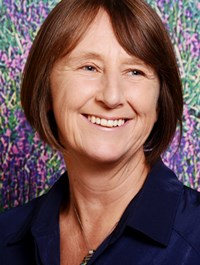Following the June special feature on ‘feedback as transformation’, Alliance asked foundation professionals in Germany, Kenya, the UK and the US about their experience of constituent/beneficiary feedback. Does it offer opportunities to foundations to improve their own performance? Should grantees be required to collect feedback? While the responses reveal a variety of practice and opinion, all four respondents see the merits of feedback. Indeed, one thinks that the ‘tipping point’ mentioned by the guest editors of the special feature has already been passed and that ‘a future of omnipresent feedback’ is here.
The following have contributed to this article:
Dawn Austwick
Darin McKeever
Ezra Mbogori
Felix Streiter
More active collaboration is the ultimate goal
Feedback from all of our stakeholders offers opportunities to improve our performance – but how well we do it presents a mixed picture. At the Big Lottery Fund we see it as fundamental to the success of our new Strategic Framework, People in the Lead. To succeed in future, we need to move from collecting feedback to listening, responding, sharing and developing with the people and communities we work with – in short, an open dialogue.
We have a huge variety of ways of collecting feedback, from regular satisfaction surveys to co-designing some of our largest funding interventions. It’s towards the latter end of that spectrum that we see some really exciting opportunities to improve our grantmaking. We’ve also used many approaches to involving beneficiaries in the development of our strategic investments in England (five programmes each targeting a complex social challenge, such as ageing or mental health).
To take an example, our Talent Match programme, which seeks to support young people into work, was co-designed with a group of 20 16-25 year olds. They spent two months consulting peers across the country to identify priorities, eventually focusing on youth unemployment and negative perceptions of young people. The group has since worked with us to design the programme and has been part of decision-making committees making major investments. In Northern Ireland, our Empowering Young People programme also involves young people in the planning and delivery of £50 million of funding over six years – including participation in decision-making panels.
‘We have a huge variety of ways of collecting feedback, from regular satisfaction surveys to co-designing some of our largest funding interventions. It’s towards the latter end of that spectrum that we see some really exciting opportunities to improve our grantmaking.’
All our grantees can budget up to 10 per cent of their grant for monitoring and evaluation and we require applicants to demonstrate they have engaged with their beneficiaries, through feedback, evaluation or other dialogue. Some of our funding programmes, such as Our Place in Scotland, go further in the level of community engagement they need to evidence. Funding is ringfenced for neighbourhoods and support is provided to build skills and confidence to draw down the money for chosen projects. One of the three core outcomes is that ‘communities have more influence on decisions taken locally’. Priorities are set by residents as part of a shared vision statement.
‘Feedback isn’t just about funders gathering insight for their own strategies. Our new Online Community aims to encourage a much broader network of projects, organizations and people to share their stories and what they’ve learned.’
Feedback isn’t just about funders gathering insight for their own strategies. Our new Online Community aims to encourage a much broader network of projects, organizations and people to share their stories and what they’ve learned. It’s been developed through user testing, and will continue to be shaped by the people using it. Our ultimate goal is to build on what we’ve learned from collecting feedback to go beyond it towards a more active collaboration. We see this as vital to improving not only our own grantmaking but also the practice of a whole host of other people and organizations.
Dawn Austwick is chief executive of the Big Lottery Fund, UK. Email Dawn.Austwick@biglotteryfund.org.uk
Are we past the feedback tipping point?
In their introduction to Alliance’s special feature on feedback, the guest editors write of a tipping point ‘when enough of us understand that making the voices of those who are meant to benefit truly matter is … not only the right thing to do, but also the smart thing to do’. I think we are well past that tipping point.
Given today’s search, social media and information technologies, our choices about whether to invite feedback or operate openly have been fundamentally altered. In much of the world, our institutions are ‘liked’, tweeted, blogged about and linked to at an astonishing speed. Feedback and the opportunity to provide it surrounds us. For the most influential organizations, the choice to ignore it remains – but the consequences of ignoring it have been recalibrated.
If a future of omnipresent feedback is already here, what are people so worked up about? I see at least three issues.
First, there is Klout and clout. For the unfamiliar, ‘Klout scores’ blend data from Twitter, Facebook, LinkedIn and other social media firms to assess the likelihood that a someone’s posts and pictures will be shared, liked and re-tweeted. Clout, on the other hand, is the ability not just to engage in conversation but to have an impact on decisions. Dennis Whittle’s piece in Alliance cites examples to demonstrate how participation in governance is not the same as power. In the same way, engagement in the tweetstream may not be the same as enfranchisement.
‘If I want a review of a restaurant in a major metropolitan area of the US, that may be easy to track down. But go to a platform like GreatNonprofits for reviews by volunteers and donors about their experiences with a charity and they are still relatively sparse.’
Second, are we getting the right level of feedback about the right things? If I want a review of a restaurant in a major metropolitan area of the US, that may be easy to track down. But go to a platform like GreatNonprofits for reviews by volunteers and donors about their experiences with a charity and they are still relatively sparse, although the numbers are growing. The ‘why worry?’ crowd might argue that the volume of feedback about particular institutions or services matches their relevance in people’s daily lives – but I’m sceptical about that.
Finally, even if we are getting feedback at the right level and about the right things, it may not be actionable. Ideas offered by constituents need to be parsed, priced and prioritized. Benchmarks can put feedback in a more helpful, comparative context. In this way, the various pilots and prototypes featured in Alliance offer on-the-ground examples of individuals and organizations trying to do this efficiently and effectively.
‘The scale of the current conversations in the sector about feedback feels too small, and the pace towards field-wide impact is glacial.’
And yet, the scale of the current conversations in the sector about feedback – at least those reflected in the Alliance special feature – feels too small, and the pace towards field-wide impact is glacial. While the great individual efforts profiled in Alliance should be celebrated and promoted, at the collective level I want to see us aiming higher. As an alumnus of the Gates Foundation, I suppose that is my ‘impatient optimism’ showing through.
I was encouraged by Melinda Tuan’s update about the Fund for Shared Insight collaborative. I was eager to know more about their efforts to test methods of collecting beneficiary feedback, both offline and online, and excited by their interest in adapting for non-profits the ‘Net Promoter Score’ widely used by customer-focused for-profits to measure satisfaction and loyalty. But those two short paragraphs were too short. I felt those lines of work could have offered valuable insights, and they might also attract private sector partners whose market knowledge and penetration could be leveraged.
‘Those passionate about feedback in the social sector should redouble efforts to partner with those that are already ‘making the world more open and connected’ (Facebook), ‘organizing the world’s information’ (Google).’
And that brings me to my last point: amplifiers of feedback grow with the spread of the internet and social media’s infrastructure every day, so those passionate about feedback in the social sector should redouble efforts to partner with those that are already ‘making the world more open and connected’ (Facebook), ‘organizing the world’s information’ (Google), or otherwise trying to make customer engagement easy or solicit feedback about products and services at significant scale. It may take time to entice their leadership, understand interests and motivations, negotiate safeguards to preserve privacy or security, and recognize the right arrangement of capabilities across for-profit, publicand non-profit actors. But jump in and start shaping that world of omnipresent feedback; much rides on getting it right.
Darin McKeever is chief program & strategy officer, William Davidson Foundation. Email dmckeever@williamdavidson.org
The author is writing in an individual capacity. The views expressed do not necessarily represent those of the William Davidson Foundation.
Sometimes feedback cannot be acted upon
Without a doubt, feedback does help us to effect changes that hopefully improve our performance, especially when it touches on things that can be easily changed.
At the Akiba Uhaki Foundation, we have created opportunities for feedback in pre-grant assessments, annual grantee convenings and activity monitoring visits. The annual grantee convening is intended both to give grantees an opportunity to learn from one another and also to tell us how we might improve our support for their efforts. As relationships grow, we have found these events useful for bringing to the surface issues that often go unnoticed and which could affect programme activity.
We have only been around for the last five years so our systems and practice are evolving, but towards the end of last year we commissioned an overall evaluation of our work. Our evaluators were exploring ways of assessing impact and we involved our grantees in gathering the information required. During this process we discovered that the monitoring system we are using is a difficult system for grantees. We are now looking at ways of simplifying it and ensuring that beneficiaries are factored in. Our concern, though, is that this will prove an expensive enterprise, so we have still to decide exactly how to proceed.
‘While we do value feedback from our grantees and other collaborators, sometimes the feedback we receive cannot be acted on because of factors beyond our control.’
While we do value feedback from our grantees and other collaborators, sometimes the feedback we receive cannot be acted on because of factors beyond our control. Our funding ceilings, for example, are set with a view to what is affordable, so raising these ceilings is totally dependent on what we can raise. The only response we could make is that we are unable to do anything. Since we don’t like to do this, we might appear to be ignoring the feedback. In fact, it is simply that we cannot make an ‘affirmative’ response.
Ezra Mbogori is executive director of Akiba Uhaki Foundation, Kenya. Email mbogori@akibauhaki.org
The many uses of feedback
Collecting systematic feedback from beneficiaries is not just an opportunity for foundations, it is a moral commitment. Unlike organizations such as private enterprises and public authorities, foundations face several challenges in getting reliable performance indicators:
- First, they are not accountable to shareholders or voters. They can continue their activities unperturbed, even if they underperform. Hence, they have to create their own performance signals.
- Second, foundations’ democratic legitimacy is critically discussed as they combine private assets and private grant decisions with a public tax-exempt status. Gathering and implementing feedback systematically is a way to increase that legitimacy.
- Third, many foundations lack transparency, especially in countries with few legal requirements. Making feedback public is an appropriate way to provide such transparency.
- Fourth, like other social actors, foundations need external, empathic feedback to confirm that they are operating successfully.
- Finally, effective outcome and impact measurement is possible only if external views are taken into account.
Stiftung Mercator is one of a number of German foundations that uses the ‘Learning from Partners’ survey (see Volker Then and Martin Hölz, ‘Grantee feedback comes to Germany’, Alliance, June 2015). Inspired by the US model of Grantee Perception Reports, the surveys are independently conducted by the Centre for Social Investment at Heidelberg University. Participants evaluate and comment on their satisfaction with all stages of contact with the foundation, the foundation`s administrative processes, its contribution to their partner`s capacity building, and the perception and positioning of the foundation within its fields of funding.
‘The results of the first study, were partly at odds with foundations’ general views of themselves.’
The results of the first study, conducted in 2011-12 with grantees and applicants of six large German foundations, were partly at odds with foundations’ general views of themselves. Only 56 per cent of respondents considered the foundations transparent; a mere 42 per cent thought them flexible; and only 63 per cent thought them innovative. The good news was that the quality and professionalism of day-to-day project management, press relations, and access to networks and know-how were seen positively. At Mercator, we set up an internal working group to analyse our results and to propose measures for improvement. For example, we introduced a new two-stage application process and are now providing more and differently structured information on our website. The second survey is currently under way with twice the number of participating foundations. The results will be published in October.
‘If nearly 300 US funders have commissioned the Grantee Perception Report, taking in the views of 50,000 grantees, why shouldn’t European foundations be able to do the same?’
My vision is to conduct the survey at three-year intervals and to widen its scope to the whole of Europe. If nearly 300 US funders have commissioned the Grantee Perception Report, taking in the views of 50,000 grantees, why shouldn’t European foundations be able to do the same?
We encourage, but don’t require, grantees to take part. In our view, making it mandatory is neither necessary nor appropriate to the way we work with grantees. We believe that mutual trust is a key element of giving. Hence, we try to keep the range of compulsory expectations for grantees, beyond specific project management, as low as possible.
Felix Streiter is director of the Centre for Science and Humanities at Stiftung Mercator, Germany. Email felix.streiter@stiftung-mercator.de
Lead image: as part of its Empowering Young People programme, the Big Lottery Fund has worked with young people to plan and deliver programmes that work for them.









Comments (1)